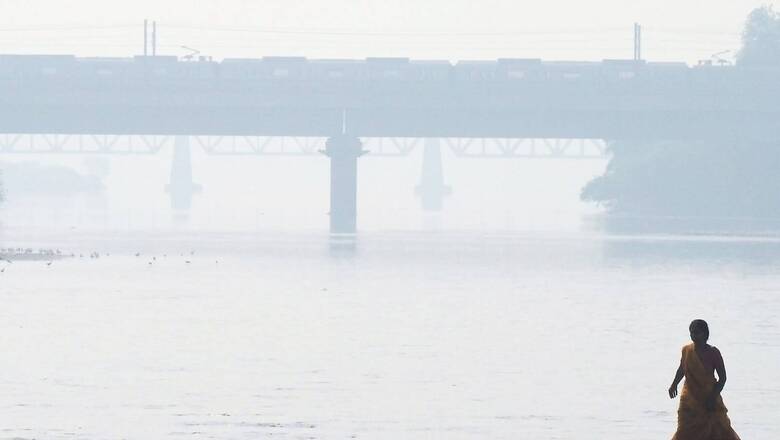
views
Diwali, winter and stubble burning form a perfect cocktail which pushes pollution levels to rise exponentially and choke lungs of people especially in Delhi. A ban on firecrackers and incentives to farmers to stop stubble burning had not proved effective with air quality plunging to hazardous levels for the past several years.
However, the silver lining comes for Delhi this year as Delhiites are breathing the cleanest air on the day of Diwali since 2019. As per average data of Delhi’s air quality in the past 24 hours by Central Pollution Control Board (CPCB), AQI was in the ‘very poor’ category (AQI 312). The data was collected using 35 monitoring stations.
Delhi’s air quality was in the ‘very poor’ Category (AQI 382) on Diwali last year (November 4, 2021). It was in the ‘severe’ category (AQI 414) in 2020, ‘very poor’ in 2019 (AQI 337), ‘poor’ (AQI 281) in 2018, ‘very poor’ in 2017 (AQI 319), ‘severe’ in 2016 (AQI 431) and ‘very poor’ in 2015 (AQI 343), CPCB data showed. The number of air quality monitoring stations has also increased over the years from seven in 2015 to 35 today.
According to air quality figures tweeted by Chief Minister Arvind Kejriwal today, average PM10 concentration dropped from 362 in October 2016 to 163 October 2022 while average PM2.5 concentration also decreased to 69 from 151 in October 2016.
These two graphs show how pollution has been decreasing over the years due to constant efforts of Delhiites. pic.twitter.com/wFxfB9h78Z— Arvind Kejriwal (@ArvindKejriwal) October 24, 2022
Kejriwal said that the war against pollution is not over yet but his government is on the right track.
After my tweets today, some people asking -hv we won war against pollution n am I satisfied? Not at all. It is encouraging that we r no more world’s most polluting city. It encourages us that we r on right track. However, we hv to become world’s cleanest city. Thats our goal— Arvind Kejriwal (@ArvindKejriwal) October 24, 2022
However, SAFAR (System of Air Quality and Weather Forecasting And Research), which also tracks air quality under the Ministry of Earth Sciences predicted that tonight AQI is likely to touch ‘Upper end of Very Poor’ or ‘Lower end of Severe’ due to expected Diwali fire cracker emissions as well as stubble fire emissions. It also said that air quality is likely to further improve on October 26 evening onwards to the lower end of ‘Very Poor’.
An AQI between 0-50 is considered ‘Good’, 51-100 ‘Satisfactory’, 101-200 ‘Moderate’, 201-300 ‘Poor’, 301-400 ‘Very Poor’ and 401-500 ‘Severe’, as per CPCB, which is a statutory organisation constituted in 1974 and serves as a field formation to the Ministry of Environment and Forests of the provisions of the Environment (Protection) Act, 1986.
Here are some factors which are responsible for Delhi’s cleanest Diwali in 3 years:
Diwali in October instead of November
Experts had earlier predicted that people in the national capital are likely to witness a less polluted festival of lights this year as Diwali is falling this October instead of November.
Experts of System of Air Quality and Weather Forecasting and Research (SAFAR)-Indian Institute of Tropical Meteorology (IITM) said that the pollution levels spike in November, which is much cooler than October in cities like Delhi, as cold air tends to trap pollutants near the earth’s surface.
“Inversions occur during the cooler winter months like November, when atmospheric conditions become inverted, with warm air above the cool air preventing vertical mixing of air. The cold air traps pollutants near the surface, causing pollution levels to rise, especially during the night-time in colder months,” Times of India reported quoting Dr B S Murthy, project director of IITM- System of Air Quality Forecasting and Research (SAFAR).
Ban on Firecrackers in Delhi
The Delhi government has put a complete ban on the sale, production and use of all types of crackers till January 1, 2023. The Supreme Court also refused to lift the ban on fire crackers in Delhi.
Those found purchasing and bursting crackers can invite a fine of Rs 200 and face up to six months in jail, those involved in manufacturing, storing and selling firecrackers in the city could be fined up to Rs 5,000 and be jailed for three years.
Delhi environment minister Gopal Rai had earlier said that the Delhi Police has formed 210 teams, each of which will be spearheaded by an officer of the ACP (assistant commissioner of police) rank. The revenue department had also formed 165 teams and there are 33 teams under the Delhi Pollution Control Committee (DPCC). These teams consist of a total of 1,279 personnel and all those who violate the ban by selling, manufacturing or storing firecrackers will have to pay a fine of Rs 5,000 and be imprisoned for three years as per Section 9(b) of the Explosive Act, Rai added.
2022 Monsoon Season in Delhi Cleanest in Last 8 Years
Delhi had the cleanest start to winters since wide-scale monitoring of air quality started in 2018. In fact, the 2022 monsoon season was found to be the cleanest (in terms of air quality). The national capital received an unprecedented 115 mm of rainfall in the first two weeks of October, which pushed the usual state of bad air quality days further. There were five “good” AQI days (for PM2.5) in the first two weeks of October — the most recorded in the last eight winter seasons — compared to mere two “good” AQI days in the 2021 winter season.
Drop in Farm Fires in Punjab
Stubble burning in Delhi’s neighbouring states especially Punjab contribute to air pollution in the NCR. The impact of stubble burning on air quality remains low due to a 50 per cent drop in fire counts in this season so far.
Punjab recorded nearly 3,700 stubble burning incidents between September 15 and October 22 and about 60 per cent of these were in three districts of Majha region — Tarn Taran, Amritsar and Gurdaspur, according to data from the Ludhiana-based Punjab Remote Sensing Centre, news agency PTI reported.
However, the situation is marginally better this year as of now in comparison to stubble burning incidents in the last two years as crop harvesting got delayed by at least 10 days because of untimely rain in September. Punjab had reported 10,785 and 5,438 such incidents till October 22 in 2020 and 2021 respectively.
Read all the Latest India News here



















Comments
0 comment